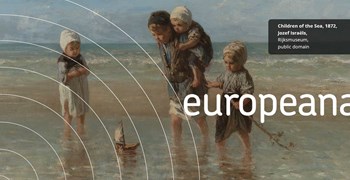2015: Top 20 Searches on Europeana
2015’s nearly over, but before we say farewell, let’s look at what you’ve been searching for this year in Europeana’s collections.
Since January, millions of searches have been typed into Europeana, and from all over the world. There are over 45 million artworks, objects, books, sounds and videos in Europeana, each from one of over 3,500 European cultural institutions. But what were you looking to find?
Here, we’ve compiled your top 20 searches from 2015.
1. West riding lunatic
Number one this year is rather unusual. It’s inspired by our collaboration with Mashable on West Riding Asylum portraits. After reading the Mashable feature in your thousands, you came looking for more. It’s a great example of the power of opening up a collection and sharing it online.
 Man suffering from mania of suspicion.
Man suffering from mania of suspicion.
Photography attributed to Henry Clarke, 1869. The Wellcome Library, CC BY
2. Vincent van Gogh
Bumped off the top spot from last year, Mr van Gogh can take pride in coming a respectable second place. From personal letters to a photograph of him as boy, there are thousands of fascinating items related to the Dutch painter’s life and work for you to explore.
 Self portrait by Vinent van Gogh. 1887. Rijksmuseum, Public Domain
Self portrait by Vinent van Gogh. 1887. Rijksmuseum, Public Domain
3. Aardewerk (pottery in Dutch)
Pots, bowls, vases, jugs – there’s no shortage of stoneware in Europeana. We rather like this prehistoric pitcher with a head shaped like an animal.
 A gray earthenware pitcher with a handle and a spout in the shape of a stylized animal head.
A gray earthenware pitcher with a handle and a spout in the shape of a stylized animal head.
1300 – 600 BC. Museon, CC BY.
4. Paris
All roads often lead to Paris for cultural historians studying Europe, so it’s no surprise that Paris features in the top 20 searches again this year. There was a marked rise in searches for the city of light at the time of the terrorist attacks, a moving reminder of how our shared culture helps us make sense of senselessness.
 Le Pont de Grenelle by Pierre Bonnard from Tableaux Modernes (…) Hotel Drouot, 5 juin 1942.
Le Pont de Grenelle by Pierre Bonnard from Tableaux Modernes (…) Hotel Drouot, 5 juin 1942.
Universitätsbibliothek Heidelberg, CC BY-SA
5. Francois Boucher
Europe’s rococo king Francois Boucher comes in at number five – a consummate marketer of his own work, we’re sure he’d be pleased. Boucher is known for his idealised paintings of classical and pastoral scenes – think simpering shepherdesses and lots of lace. Philosopher Denis Diderot condemned him as the embodiment of corrupt decadence, though even he admitted, ‘C’est un vice si agréable!’ (It’s such an agreeable vice!). Clearly, visitors to Europeana agree.
 Girl with a dove. Print by Gilles Demarteau after François Boucher. 1756 – 1776.
Girl with a dove. Print by Gilles Demarteau after François Boucher. 1756 – 1776.
Rijksmuseum, Public Domain
6. Mona Lisa
7. Edouard Charton
8. Teller (Plate in German)
9. Spain
10. Plinius Secundus (Plinius the Elder)
11. Picasso
12. Marc Chagal
13. Babel tower
14. Samuel Scheidt
15. Cat
16. Shakespeare
17. Torino
18. Music
19. Benczur Béla
20. Autumn

The cat at play, Henriëtte Ronner, Rijksmuseum, public domain.
Babel from BL Add 27210, f. 3. British Library, public domain.

William Shakespeare from “An attempt to ascertain the order in which the plays attributed to Shakespeare were written.” British Library, public domain.
Edward Elgar: ‘Fringes of the Fleet’. Miscellaneous annotated parts for no. 4. British Library, CC0.
Turin. Vue prise au-dessus du Couvent du Mont | Guesdon, Alfred, Springer, A. ONB, public domain.
Plinius Secundus (Pliny), Aurem opus et. Wellcome Library, CC BY.
















